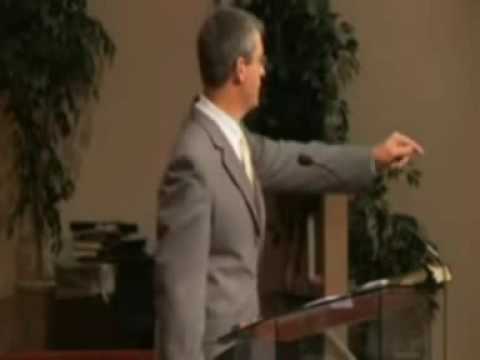But they rebelled and saddened his Holy Spirit, so he became his enemy and he himself fought against them (Isaiah 63:10).
The Lord is a jealous and vengeful God, the Lord is a vengeful and full of anger; the Lord will take revenge on his adversaries and reserve outrage for his enemies (Naum 1. 2)
- After considering God’s righteous indignation manifested by his anger and fury.
- We will turn our attention to a related subject: the hostility that exists between God and the unrepentant sinner.
- It is the duty of the preacher of the gospel to warn men of the holy war that God has declared against his enemies and to plead with sinners to reconcile with God before it is too late.
- The divine promise of amnesty to the rebel is genuine.
- But it must not be fulfilled.
- The day comes when the olive leaf and the canceled Peace Offering will be removed.
- At that moment.
- All that will remain of the sinner will be: A horrible expectation of judgment and vengeful fire about to consume the adversaries?It is a horrible thing to fall into the hands of the living God.
The popular saying that “God loves the sinner but hates sin” tends to follow a similar cliché: “Man is at war with God, but God is never at war with man. ” Therefore, much is said about the sinner’s hostility and his relentless warfare. against God, but little or nothing about God’s incessant war against the sinner.
Regardless of this current current of evangelical thought, it is extremely important to understand that the hostility between God and the sinner is not one-sided, but mutual. When men declare war on God, God becomes an enmity and fights against them [2]. Although this is a troubling truth, the scriptures clearly teach that God considers the unrepentant sinner to be his enemy and has issued a declaration of war against him. The sinner’s only hope is to surrender his weapons and raise a white flag of surrender before him. it’s too late, forever. [3]
Nahum’s book tells us, “The LORD takes revenge on his adversaries and reserves the indignation of his enemies. “/ 064] The first truth taught by this text is that it is God who regards the wicked as his adversary. He does not regret that man considers him his enemy, but declares his own disposition against man. It is God who draws the battle. The second truth to be learned is that God is on the offensive; he does not just stand, receiving attacks from evil men, but he himself gives the cry of war and runs into battle with all the force of his wrath. The Psalmist warns: God sharpened his sword, built his bow, prepared him, and prepared deadly instruments against his enemies. If the wicked do not repent, he will surely perish under divine wrath. [5]
Is it imperative that we understand and accept this “holy war” truth? it is not a relic of the old covenant or a primitive view of God annulled by the progressive revelation of the New Testament. Rather, it is a biblical and enduring truth, found in Scripture. In the book of Romans, the apostle Paul writes: “When we were enemies, we were reconciled to God through the death of his Son. ” – 066] Although this text communicates the idea of mutual hostility between God and the Lord. Man, the main emphasis is not on the sinner’s hostility to God, but on God’s opposition to the sinner. Realizing that this concept is alien to the vast majority of contemporary evangelicals, the following scholars offer further confirmation: Charles Hodge stated that: “There is not only a perverse rivalry between the sinner and God, but a holy rivalry between God. and the sinner. “7]; Louis Berkhof stated “not that they are hostile to God, but that they are the object of God’s discontent” [8]; and Robert L. Reymond explained that “the word ‘enemies’ is more likely to be constructed in the passive meaning (‘hated by God’) than in the active meaning (‘hate God’). In other words, the word? Enemies? It does not emphasize our evil hatred of God, but rather God’s holy hatred of us. [9]
According to our text, man sinned and God was the offended part. For reconciliation to occur, man’s offense had to be suppressed, God’s righteousness satisfied, and God’s wrath against the appeased man. We know that Christ’s death did not do all men voluntarily. pro-God, because most continue to oppose him and his will with anger; However, Christ’s death satisfied the righteous demands of a holy God, so that he could support his enemies and extend to them an olive leaf of peace through the gospel. Those who repent and believe in Christ will be saved, but those who refuse will accumulate anger against themselves for the day of God’s wrath, when their righteous judgment will finally be revealed. [10]
[3] Pastor Charles Leiter was the first to draw my attention to this idea.
[7] Charles Hodge, Commentary on the Epistle to the Romans (London: Banner of Truth, 1989), 138.
[8] Louis Berkhof, Systematic Theology (Sao Paulo: Cultura Crist, 2002), 344.
[9] Robert L. Reymond, A New Systematic Theology of the Christian Faith (Nashville: Thomas Nelson, 1998), 646.
Excerpt from chapter 16 of the book “The Power and Message of the Gospel?From Paul Washer, which will be published by Faithful Editor. We had the opportunity to translate it and the privilege of being able to share with you brief excerpts from each chapter. .
Translation: Vin-cius Musselman Pimentel. Un revised or modified version. Published with permission.
© Faithful Editor. All rights reserved. Original: Holy War (Paul Washer) [16/26]
Authorizations: You are authorized and encouraged to reproduce and distribute this material in any format, provided that the author, his ministry and translator are no longer no longer modified and not used for commercial purposes.

